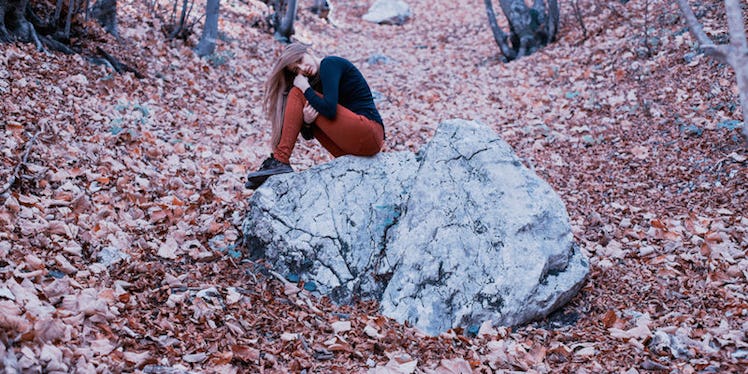
How Social Media Makes Us See Ourselves Through The Eyes Of Other People
If you've never heard of the likes-to-minutes ratio on Instagram, allow me to explain.
Apparently, once you put a photo on Instagram, an invisible clock begins that tracks the amount of time that passes in relation to the amount of likes your picture gets. Obviously, a high likes-to-minutes ratio is ideal for the coolest of Instagram users.
A friend of mine recently explained this phenomenon to me and I was floored. People are really, truly conscious of this? What happened to sharing for the sake of sharing? Scratch that. Nobody does that.
When I first got a MySpace, back in the dinosaur era, the only picture I had was of my eyeball: a cropped photo of my mascara-less, eighth-grader pupil and iris. Why? Admittedly, I was a bit strange, but also because that's just how I wanted it.
I didn't really care about how many comments or likes it got. I didn't really care how I was portraying myself. Perhaps it was just me, but I could not have cared less about Internet Me.
Cut to a few years later. MySpace is now replaced by Facebook, and our identities have become boiled down to an accumulation of likes, photos and quirky statuses.
Now, it really is all about the pictures, or it didn't actually happen. And no, if you didn't Instagram your Pumpkin Spice Latte, you probably didn't drink it.
How have we come to this? Even employers consider people without Facebooks suspicious. You cannot exist in this world without both a real-life version and an online version of yourself -- and, sometimes, the two do not align.
In real life, we are all about finding ourselves; on social media, we are all about finding the version of ourselves that gets the most positive feedback.
You may share things on social media because you genuinely think said things are capital-I Interesting, but you can't pretend that you wouldn't feel a weird pang of insecurity if nobody liked the article you posted about Ebola or the Reptilian Agenda.
Who the f*ck cares who likes your article about Ebola or the Reptilian Agenda though... right? Right?
Honestly, I hate to break it to you, but you do. You care. You wouldn't have posted it if you didn't.
All of this is detrimental to how we view ourselves. If someone likes our post, we are validated -- as funny (if on Twitter), as beautiful (if on Instagram), as worthy (if on Facebook). On social media, we simply don't trust our own judgment when it comes to our humor, our interests and our very selves unless someone else affirms it first. And that's a problem.
Making a decision to post something on social media means making a decision to be seen. Even more so, it means making a decision to be reacted to -- or not reacted to.
The other day, I heard my friend decide to tweet something because "people would be impressed" with it. I don't know if she would have tweeted it if she didn't think people would have been impressed with it, but I do know that she did indeed tweet it and her reason seemed like it had to do with the responses of other people.
Have you ever tweeted something you thought was a good joke and then removed it five minutes later when you thought it sucked? What was your reason for deleting it? Don't lie to yourself. You know the reason. It's because everyone else thought it sucked first.
With social media, you have time to meticulously craft the kind of person you want to be, with specific kinds of posts, pictures and likes in the music section plastered all over your page.
Well, you don't have nearly as much time to piece together a witty thought when you're having a conversation in real life, you can't VSCO-Cam your way to beauty at a party and you certainly can't prove that you like M83 without at least being able to talk about a few songs.
Once something is posted, you await the judgment -- the like button, the favorite button, the heart button -- patiently, like floating in purgatory before entering Heaven or Hell.
The response to the post defines the post. Were people impressed? The pressure is on. Everyone on your news feed will see either way.
I'd like to think that, one day, the necessity of a social-media self will fade and we'll stop feeling like we have to quantify how cool we are by the number of likes and photos we have.
Constantly performing for an audience of thousands is exhausting. Is what you post on social media the real you, or is it the you that you want others to see and react to?
Some would say we live every second of our lives performing for other people, but I would counter that by saying the time I had a conversation about existentialism with the guy I like while walking around a lake was not simultaneously filled with quick Google searches of philosophical concepts before I typed out a response on a Facebook post.
Everything about that conversation was present and spontaneous. A face-to-face performance is a different kind of performance. It was real. It consisted of what I knew, what I didn't and what I was curious about knowing at that exact moment in time.
He was truly getting an unfiltered me.
Photo Courtesy: We Heart It